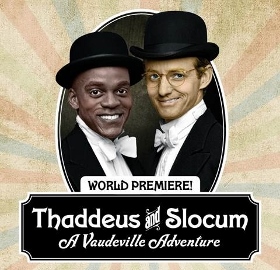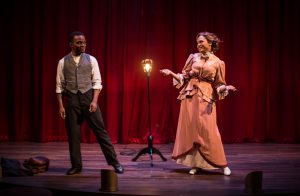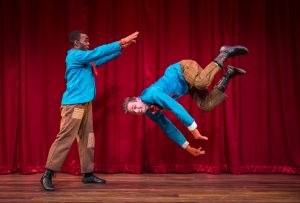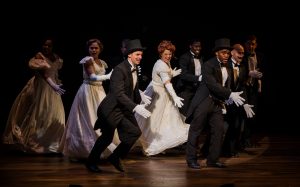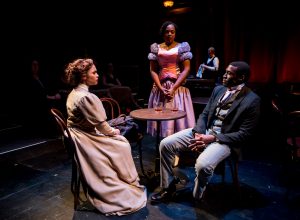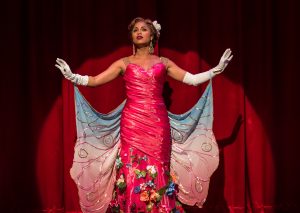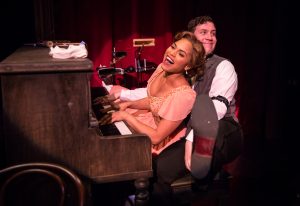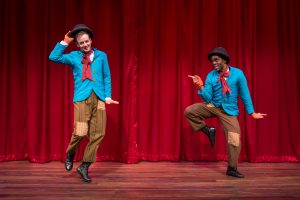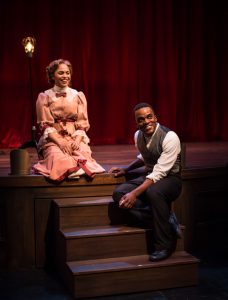CORKING UP OR SELLING OUT?
Living up to its title billing, Lookingglass Theatre Company’s world premiere Thaddeus and Slocum: A Vaudeville Adventure is a rampage down Memory Lane. Their 135-minute blast from the past evokes the glory days of broad burlesque and novelty acts, as well as literally darker doings. A guilty pleasure and an ambivalent delight, it celebrates and subverts Chicago’s music-hall era. Kevin Douglas’s two-act drama is, regrettably, more premise than delivery, but like George C. Wolfe’s similarly-themed The Colored Museum, it effectively indicts a still-shameful theatrical double standard.
Black performers could never be black enough for white audiences, so they “corked up” in “blackface” to deliver stereotypical Step ’˜n Fetchit-style shenanigans. (Curiously, the period’s ugly racist tomfoolery is not shown on Lookingglass’s stage.) Of course, white players “blackened” themselves too’”and not just in minstrel shows: remember Al Jolson. But it was a very asymmetrical pretense: African-American song and dance stars never “whited up.” There was no such trick as “whiteface,” however balanced and equitable that reverse racism might have seemed.
This rollicking and bittersweet co-staging by J. Nicole Brooks and Krissy Vanderwarker returns us to the smoke-filled nights of the Orpheum and TOBA circuits (one for whites and one for blacks). We’re in 1908 Chicago, now celebrating World Series victories that would surely usher in a Cubs dynasty. The dream venue for variety acts is the Majestic Theatre, the Windy City equivalent of playing the Palace. But this top drawer only had one “colored” act, the unseen illusionist Black Magic. That “plaster ceiling” is both curse and challenge for the mixed-race duo of Thaddeus and Slocum, childhood chums who indulge in acrobatic high jinks, silly patter, and pizzazz-packed duets. Coached by Slocum’s dad, who ruefully realized that Thaddeus’s skills outshone his son’s, the partners have long paid their dues as street buskers or at less respectable establishments. It’s time to do downtown.
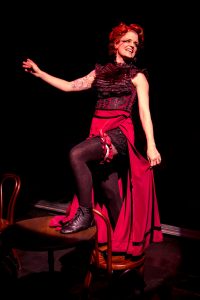 To reach the big time, pale Slocum (Samuel Taylor) and dusky Thaddeus (Travis Turner) practice their act, perilously, by using their very blackface to conceal their identities. As “Theseus and Sloan,” they get into a raucous row at a low-class theater in the notorious Levee district, inciting the rage of a competing showman (Adam Wesley Brown) who vows an ugly revenge.
To reach the big time, pale Slocum (Samuel Taylor) and dusky Thaddeus (Travis Turner) practice their act, perilously, by using their very blackface to conceal their identities. As “Theseus and Sloan,” they get into a raucous row at a low-class theater in the notorious Levee district, inciting the rage of a competing showman (Adam Wesley Brown) who vows an ugly revenge.
Caught between two cultures, Thaddeus finds himself drawn in conflicting directions’”to perform as a solo at the black-only Pekin Theatre and to romance Isabella (Monica Raymund), an octaroon chanteuse who passes for white at the high-toned Majestic. It’s Romeo and Juliet as Shakespeare never imagined. Of course, any public courtship that African-American Thaddeus can offer this sweet “high yellow” songstress could expose her subterfuge.
Douglas’s action is fueled by a retroactive quest for justice in entertainment. But, with equal ardor and delightful results, Lookingglass wallows in nostalgia: Set designer Collette Pollard has transformed the malleable Lookingglass stage into a vintage vaudeville temple, complete with filigreed bands of filament bulbs, red velvet proscenium and curtains, the obligatory footlights, and a wooden thrust stage to contain the gaiety. T&S is accurate in everything but one detail: The “real” audience never gets to hiss or throw rotten tomatoes or cabbages at the lousy acts. (Some Chicago shows lately have deserved no less.)
Besides Isabella’s uncredited ballads, we glimpse the Majestic’s top acts, including a lame white comic Johnny (Brown) cracking idiotic jokes, a two-man cow doing an inept Irish jig, and muscular Lawrence DiStasi performing gymnastic sensations. We also savor the Pekin’s cakewalking, tap-dancing phenoms Zeke and Nellie (Tosin Morohunfola and Sharriese Hamilton), hoofing up a storm in costume designer Samantha Jone’s turn-of-the-century finery. Thaddeus and Slocum are no slouches either, busting loose in the exuberant’”and predictive–opening number “It’s Hard to Be Us.”
These festive interludes intermittently distract from Thaddeus and Slocum’s much-tested dream to play the Majestic based on talent, not skin. When the Majestic’s booker Frank (DiStasi) takes them on as a black-and-white “colored” act, Thaddeus is ironically forced to keep the cork on continually to look white. (It strangely recalls the 1952 Cecil B. DeMille CinemaScope film The Greatest Show on Earth where Jimmy Stewart played a falsely accused murderer who, disguising himself, always wore clown pancake makeup to hide his identity.)
But the inevitable evening arrives when the theater’s impresario Gerry (Raymond Fox), egged on by his insufferably bratty daughter Sarah (Molly Brennan), decides that the Majestic is not a minstrel show’”so Thaddeus and Slocum must go on without makeup. The night of reckoning has finally arrived.
Playwright Douglas’s resolution of the crisis is not very satisfying: It fizzles when it should explode, but in 1908 it may have been the only way out. That perfunctory disappointment aside, the final ending drives home Douglas’s incontrovertible argument: Merit will out’”even if it means going to Europe first to gain glory in Chicago.
Like the showbiz equivalent of Vladimir and Estragon, Taylor and Turner make a volatile team, Slocum a hard-drinking, harder-hoping sweet sap, Thaddeus a ball of eloquent energy ripe for life and love at every turn of the plot. Just as Douglas’s “adventure” requires, they sizzle or slump with fire or frustration. It’s well worth the ride but “Ladies, please remove your hats”; those ostrich feathers block the view.
Thaddeus and Slocum:
A Vaudeville Adventure
Lookingglass Theatre Company
Water Tower Water Works, 821 N. Michigan
ends on August 14, 2016
for tickets, call 312.337.0665
or visit Lookingglass
for more shows, visit Theatre in Chicago
